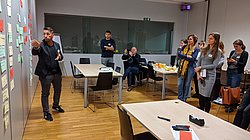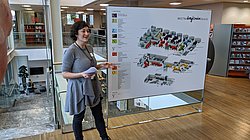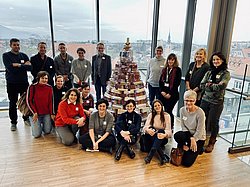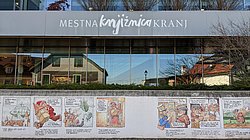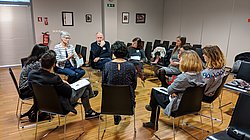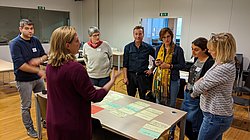Partner Meeting - Kranj (Slovenia) 11 to 13 December 2019
The partner meeting was opened by Director of MKK Breda Karun (Kranj City Library) and Matthias Quaschnik, representing the coordinating partner Iserlohn. He also gave an insight on Ray Oldenburg's “Third Places concept” and its sociological basics. Further Matthias Quaschnik pointed out features of third places as a proposal for a common basis of CROSS (based on the Funding program "Third places" by the Ministry of Culture and Science North-Rhine Westphalia, 2019):
- Physical permanent location
- Good accessibility (village centre)
- Low threshold (no entry) and barrier-free
- Opening times in the evening and at the weekend
- Welcoming atmosphere (gastronomy possible)
- Cultural offers, networking of different uses
- at least two actors are united (education and encounter)
- Incorporation of civic initiatives (Volunteers should be responsible) - Sustainable responsibility structure (Financing and personnel)
- Technical basic equipment (WIFI, presentation technology, etc.)
- Participation process, (involve different user groups) - allow new ideas!
- Involvement in urban/regional development (Orientation to local business concepts)
In parallel workshops the participants representing all partners worked intensively on different aspects of demographic challenges and Third Places for seniors
- goals and intentions (moderation: Kranj)
- content and topics (moderation: Caudete)
- methods and ways (moderation: Iserlohn)
- media and tools (moderation: Nyíregyháza)
As results the participants agreed on what we expect as minimum set of goals and intentions as well as content and topics. Further nice to have goals and topics were evaluated. Based on the partners’ experiences of successful – in previous projects/times – methods, tools and media were evaluated and selected to be part of the future toolbox.
Lejla Faji? (Institute of Macroeconomic Analysis and Development of the Republic of Slovenia) reported on demographic challenges in long-living society in the case of Slovenia, also in comparison to the other European states. In-depth presentation from partners Nyíregyháza, Caudete, Kranj, Oosterschelde gave a deeper insight of different as well as comparable demographic situations and the ways to deal with these situations as public libraries and adult education centres from a theoretical and practical view.
Finally the participants collected best practice ideas, what Third Places should characterise, and best practice examples of existing Third Places run or known by the partners.


